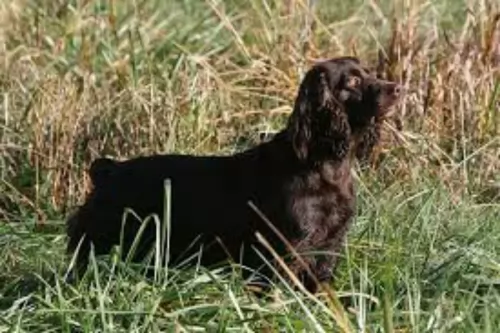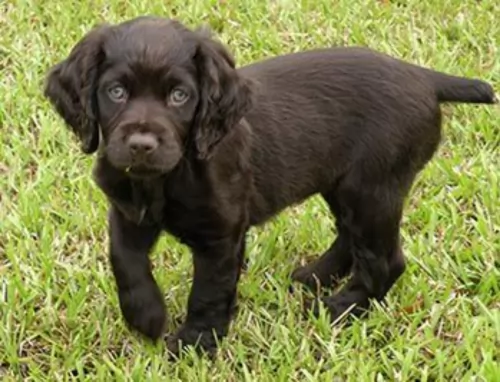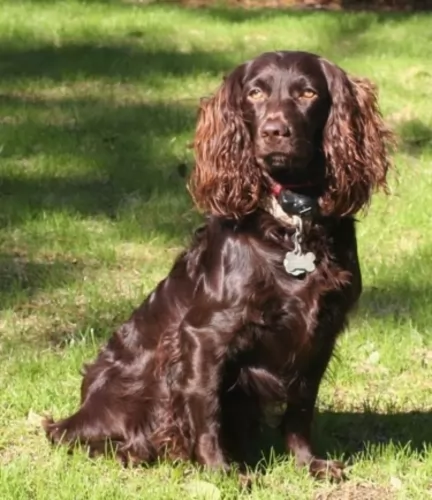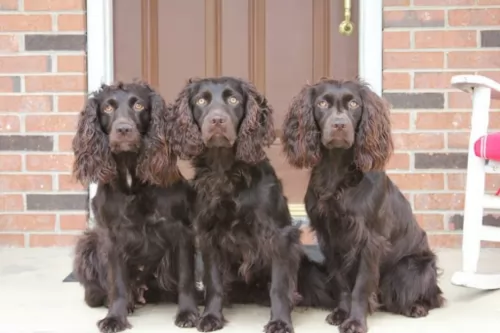 Petzlover
Petzlover Boykin Spaniel is originated from United States but Fox Terrier is originated from United Kingdom. Boykin Spaniel may grow 7 cm / 3 inches higher than Fox Terrier. Boykin Spaniel may weigh 9 kg / 20 pounds more than Fox Terrier. Both Boykin Spaniel and Fox Terrier has almost same life span. Both Boykin Spaniel and Fox Terrier has almost same litter size. Boykin Spaniel requires Moderate Maintenance. But Fox Terrier requires Low Maintenance
Boykin Spaniel is originated from United States but Fox Terrier is originated from United Kingdom. Boykin Spaniel may grow 7 cm / 3 inches higher than Fox Terrier. Boykin Spaniel may weigh 9 kg / 20 pounds more than Fox Terrier. Both Boykin Spaniel and Fox Terrier has almost same life span. Both Boykin Spaniel and Fox Terrier has almost same litter size. Boykin Spaniel requires Moderate Maintenance. But Fox Terrier requires Low Maintenance
 The Boykin Spaniel was originally bred by South Carolina hunters as the perfect dog for hunting wild bird during the early 1900s. Alexander White of Spartanburg found a short, well built dog and named him Dumpy. The dog was given to a certain L. Whitaker Boykin and a similar dog in looks was found and mated with Dumpy on Boykin’s Pine Grove plantation. Whitaker Boykin was particularly looking for a special kind of hunting dog breed that could wade into swamplands and into water.
The Boykin Spaniel was originally bred by South Carolina hunters as the perfect dog for hunting wild bird during the early 1900s. Alexander White of Spartanburg found a short, well built dog and named him Dumpy. The dog was given to a certain L. Whitaker Boykin and a similar dog in looks was found and mated with Dumpy on Boykin’s Pine Grove plantation. Whitaker Boykin was particularly looking for a special kind of hunting dog breed that could wade into swamplands and into water.
Boykin’s spaniels were popular in South Carolina before World War II and later, in 1977, the Boykin Spaniel Society was founded to ensure the breeding standards of the dog. In 1985, the Boykin Spaniel was declared the state dog of South Carolina and recognized by the American Kennel Club in 2009.
 The Wirehaired Fox Terrier and the Smooth Fox Terrier were for over 100 years the same breed of dog. Now it is believed that they are two separate breeds with two separate ancestry. It is an English creation with Dachshunds, Fox Hound, English Hounds, and Beagle in their background. It is also believed that the Wales, Durham and Derbyshire extinct rough-coated black and tan working terrier. The white terrier breeds that exist today are related to the Fox Terrier. In addition, it is recognized that terrier breeds of today such as the Jack Russel, the Rat Terrier, and the Miniature Fox Terrier are descendants of the Fox Terrier.
The Wirehaired Fox Terrier and the Smooth Fox Terrier were for over 100 years the same breed of dog. Now it is believed that they are two separate breeds with two separate ancestry. It is an English creation with Dachshunds, Fox Hound, English Hounds, and Beagle in their background. It is also believed that the Wales, Durham and Derbyshire extinct rough-coated black and tan working terrier. The white terrier breeds that exist today are related to the Fox Terrier. In addition, it is recognized that terrier breeds of today such as the Jack Russel, the Rat Terrier, and the Miniature Fox Terrier are descendants of the Fox Terrier.
They are one of the oldest of the terrier breeds dating back to the 17tth century in the British Isles. They were primarily farm dogs guarding against the fox and vermin. Like any terrier they go to ground – digging, growling, barking and lunging at the den until the animal comes out and the farmer killed it. The breed was made popular in England through their living with royalty. The Nots Kennel had a lot to do with this as well. King Edward VII’ Wire Fox Terrier came from the Notts Kennel. The Best Champion of Crufts in 1911 was a Wire Fox Terrier, and Queen Victoria had one as well. The Wire Fox Terrier finally became a family dog in the 1930’s. During this time there were feature movies and comic strips that feature a Wire Fox Terrier, such as The Thin Man and The Adventures of Tintin.
The late 1900’s saw the population moving off the farms, out of the country and into the cities. This caused a decline in the popularity of the breed. Keeping terriers born to hunt in the city proved a challenge in the beginning. Their popularity is influenced as well by the breeds success in the prestigious Westminster Kennel Club Dog Show in New York – second only to the Crufts Dog Show in England. Adding to their early success at Crufts, the Wirehaired Fox Terrier breed has won more Westminster Best in Show than any other with 14. Only five dogs have won at Westminster more than once and one of those is a Wirehaired Fox Terrier. A Smooth Fox Terrier won it three times.
 You can’t miss the medium-sized Boykin Spaniel with his magnificent coat in different shades of brown. When he gleams in the sun he looks like chocolate. This type of Spaniel is a bit bigger than the English Cocker Spaniel, but he is heavier, weighing between 13 to 18kg. He has large, floppy feathery ears and the tail has always been docked to give him that distinct look, but now with rules and regulations, the tail is often left so that it is long and feathery. The height of this dog at the withers is 39 to 43cm.
You can’t miss the medium-sized Boykin Spaniel with his magnificent coat in different shades of brown. When he gleams in the sun he looks like chocolate. This type of Spaniel is a bit bigger than the English Cocker Spaniel, but he is heavier, weighing between 13 to 18kg. He has large, floppy feathery ears and the tail has always been docked to give him that distinct look, but now with rules and regulations, the tail is often left so that it is long and feathery. The height of this dog at the withers is 39 to 43cm.
The length of the dog’s coat varies somewhat because of the different breeds from the past. Essentially the coat is medium length and wavy to curly with light feathering around the legs, ears, chest and stomach.
The Boykin Spaniel is social and he makes an excellent family pet. He is good around children and other dogs, and with training and socialization he becomes even more amicable and obedient.
 The Wirehaired Fox terrier is a sturdy dog with features quite similar to the Smooth Fox Terrier. It is symmetrical with a short back, round, dark eyes, a body that is shorter and ears that are v-shaped. He is medium sized with a flat skull that narrows as it approaches the nose. The nose is black, and the muzzle also tapers to it. The breed has a high, docked tail outside the United Kingdom. The tail is natural in the United Kingdom. They don’t have a broad or narrow chest, but it is deep. Laid back shoulders and a short back are signs of good breeding. Their legs are strong, and their feet have tough, cushioned pads.
The Wirehaired Fox terrier is a sturdy dog with features quite similar to the Smooth Fox Terrier. It is symmetrical with a short back, round, dark eyes, a body that is shorter and ears that are v-shaped. He is medium sized with a flat skull that narrows as it approaches the nose. The nose is black, and the muzzle also tapers to it. The breed has a high, docked tail outside the United Kingdom. The tail is natural in the United Kingdom. They don’t have a broad or narrow chest, but it is deep. Laid back shoulders and a short back are signs of good breeding. Their legs are strong, and their feet have tough, cushioned pads.
 The Boykin Spaniel is a diverse breed. The characteristics of the dog aren’t set in stone. He is a hunting dogs with boundless energy and enthusiasm. He is an intelligent breed and responds well to training and is obedient to your commands. He is all about fun and excitement and he is guaranteed to make a splendid companion.
The Boykin Spaniel is a diverse breed. The characteristics of the dog aren’t set in stone. He is a hunting dogs with boundless energy and enthusiasm. He is an intelligent breed and responds well to training and is obedient to your commands. He is all about fun and excitement and he is guaranteed to make a splendid companion.
Active and social, he is going to need input from his owners in terms of exercise and mental stimulation. He isn’t a dog to just ignore and in exchange for love and care, he is going to be a loving, loyal and fun companion for you.
 The Wirehaired Fox Terrier is good with children but if teased and frustrated he could bite. Children should know how to play with them and not to tease them.
The Wirehaired Fox Terrier is good with children but if teased and frustrated he could bite. Children should know how to play with them and not to tease them.
He is great at performing tricks, tracking, agility, watch dog, competitive hunting or field trials.
The Wirehaired Fox Terrier is quite adaptable and can live anywhere. He is not a big dog but remember he is very high energy.
The breed is very smart but being independent thinkers, they can be difficult to train at times. Consistency and patience are needed when training the Wirehaired Fox Terrier. They get bored easily and if training sessions are not fun you will lose them. This is a breed that loves people but need constant supervision and companionship.
 The Boykin Spaniel is a healthy breed with a life span of 14 to 16 years. There are some diseases that you want to be aware of with your Boykin Spaniel.
The Boykin Spaniel is a healthy breed with a life span of 14 to 16 years. There are some diseases that you want to be aware of with your Boykin Spaniel.
Always be aware of Hip Dysplasia as it can reduce your pet’s quality of life.. In dogs with hip dysplasia, the hip joint doesn’t to develop properly and deterioration sets in and your pet can lose function of the joint. You’ll notice your pet battling to stand up after lying down. The frightening this is that some dogs begin to show signs of hip dysplasia as early as 4 months of age.
The Boykin Spaniel’s most common health problems apart from hip dysplasia are patellar luxation and juvenile cataracts.
 This is basically a healthy breed, but there are some potential issues that could arise:
This is basically a healthy breed, but there are some potential issues that could arise:
This is possible in white terriers
 The Boykin Spaniel has been a gun dog and because he is energetic, he will need plenty of exercise and activities. Take him for walks or allow him to swim in the farm dam if you live in the country. He isn’t a dog to leave on his own in your backyard as he needs exercise as well as mental stimulation to keep him from becoming frustrated and developing destructive habits.
The Boykin Spaniel has been a gun dog and because he is energetic, he will need plenty of exercise and activities. Take him for walks or allow him to swim in the farm dam if you live in the country. He isn’t a dog to leave on his own in your backyard as he needs exercise as well as mental stimulation to keep him from becoming frustrated and developing destructive habits.
The Boykin’s hair will need to be brushed as least twice a week to prevent it from matting, particularly if he is a country-living dog, in and out of water and running through long grass. He is not a heavy shedder but his shedding is seasonal. As a long eared dog, he will need to have his ears checked to prevent infection.
Other grooming habits to get used to with your Boykin Spaniel are having his nails trimmed and brushing his teeth at least 2 or 3 times a week with special dog toothpaste and brush.
Boykin Spaniel owners who know the breed well say that there is nothing better than feeding your dog raw meat with vegetables and rice. Of course, not everyone can afford to feed their pets raw meat every day, and that’s alright. Just make sure that every now and then you include raw meat into your pet’s diet.
The very best commercially produced dog foods can also be good for your pet. If in doubt, speak to your veterinarian about the best food for your active, energetic pet. Never, ever deprive your pet of fresh, cool water throughout the day and night.
 Give them two meals maybe three per day. Total food per day divided into the number of meals is 1/8-1/4 cup day.
Give them two meals maybe three per day. Total food per day divided into the number of meals is 1/8-1/4 cup day.
Once again feed one-two meals per day and don’t overfeed. Total of ½ cup day
Being a terrier, the Wirehaired Fox Terrier needs a lot of exercise. He is energetic and playful. He loves to play ball, take interesting walks, and play in fenced areas. He needs to be in either a fenced area or on a leash as he will chase any small animal that he sees moving. But if you leave him unsupervised in a fenced area, don’t forget he is a terrier. He is likely to dig under or climb over a fence that isn’t entirely secure.
He loves earth dog trials, agility, tracking, hunting, flyball, and running. He hardly ever walks. He can play ball chasing for hours if you let him. Exercise is bonding for you and your Wirehaired Fox Terrier.